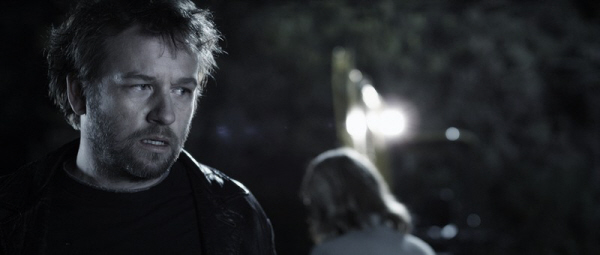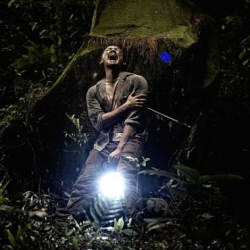
This is going to start with something small and intimate.
I’ve been a long time chewer at CHUD, and when I finally got to that point where I could start really writing for this beautiful site, life whisked me off to a tiny island in Southeast Asia. There’s a point to this story. As a film lover, it turns out there’s a big perk to living out here – The Busan International Film Festival in South Korea. This thing is pretty monstrous, and is one of Asia’s biggest premier festivals.
And I knew nothing about any of the films being shown.
So, rather than take a rational approach to this, I’d decided to go with my gut with the film choices. The results, well…you’ll see.
Shadow People (USA, aka The Door, dir. Matthew Arnold)

A radio talk show host unravels a conspiracy about encounters with mysterious beings known as The Shadow People and their role in the unexplained deaths of several hundred victims in the 1980s. Starring Dallas Roberts (“The Grey”) and Alison Eastwood (Poolhall Junkies)
“Shadow People”, which premiered earlier this year at Cannes, begins in a documentary style format, showing real, frightened people discussing a video that was posted online depicting a sleep experiment gone wrong. We don’t see the video, we just see others reacting to it. Which, you know, is cool.
If that’s what the movie was about at all.
“Shadow People”, a film built on plenty of unique ideas (which is a Unicorn, in a genre like this, to be frank) suffers from an identity crisis. As the movie progresses, we cut to lots of “talking heads” of real people talking about the phenomenon of sleep paralysis, and how it is possibly linked to a dimensional rift where dark spirits emerge and suck out your soul. It’s a premise we’d seen dozens of times before, but presented in a unique enough way to buy into all of it.
The sad part comes when we cut to the film’s acted scenes. The result feels very much like an episode of “America’s Most Wanted”. I can’t help but feel like the film would have been much better as a straight documentary. Instead we’re treated to Dallas Roberts, an actor I otherwise can stand, wander around muttering to himself, muttering to his ex-wife, muttering to radio or muttering to his child.
There’s an awful lot of muttering in this film.
In terms of aesthetics, the flick is pretty. The lack of visual effects is welcome, as this could have become a CGI happy affair, like so many of these movies with a similar premise have before. The film leans heavily on the “jump scare” (the lowest form of scaring, if you ask me), but because of the directorial choices made in the film, it works for the most part.
I’d recommend seeing this film if you’re a horror fan. Anchor Bay has it scheduled for an American release some time next year. Keep an eye on it if you want a thought provoking, albeit inconsistent suspense flick.
Modus Anomali (Indonesia, dir. Joko Anwar)
 A man must save his two children when they disappear during a holiday in the woods.
A man must save his two children when they disappear during a holiday in the woods.
We fade in on a lush, green forest. We see a small fog roll in below the tree canopy. A beetle crawls up a trunk. A mantis walks across a branch. Bird chirps echo through the scenery.
A man EXPLODES OUT OF THE FUCKING GROUND HOLY SHIT HE WAS BURIED ALIVE BUT NOW HE’S OUT AND OH MY GOD.
That was my experience during the opening scene of “Modus Anomali”, a breathless thriller from Indonesia. The premise is short – A man who’s forgotten his name must race against time to find the rest of his family stranded in the woods, while being pursued by a killer.
Incredibly well paced and well shot, the film starts with a bang and stays that way, with the tension only rising. Structurally, it feels a lot like last year’s “Buried”, with a whole forest to work with, rather than a coffin.
Rio Dewanto is burdened with the lead role. Since most of the screen time is devoted to him, his performance (most of which is spent running in fear) has be believable, and lucky for us he nails the soul crushing anxiety of a man who is unsure if he’s lost everything. He is the Anti Neeson, someone who is barely capable of holding himself together enough to continue down a wooden path, let alone try to find his family.
There are two major gripes to the piece, one being completely irreversible: the language. Rather than speaking Bahasa, they chose to go the English route (probably with hopes for an international audience). The results are a bit sad – I had thought for a solid chunk of the movie that we were being treated to a dubbed track. That’s not the case – these actors are painfully speaking a language that is very unfamiliar to them. Luckily, the lead fares better than the rest of them, but not enough to make this problem less apparent.
The other hurdle (that the film can probably fix with some clever editing) is that the last twenty minutes is ghastly. I don’t want to discount the rest of the piece, but it contradicts everything that was set up in the first half, and without spoiling, almost ruins the entire thing.
Overall, the film is an enormous step in the right direction for the thriller genre. Goretastic, breathless, and shocking – Indonesia is having a pretty good year for film.
The Fourth State (“Die vierte Macht” Germany, dir. Dennis Gansel)
 A journalist gets caught up in a terrorist plot in Moscow while investigating the Russian secret service.
A journalist gets caught up in a terrorist plot in Moscow while investigating the Russian secret service.
“The Fourth State”, a German film shot on-location in Moscow, is a perfect merging of daring new ideas, and what constitutes a traditional American styled espionage thriller.
After an explosion levels a (what is assumed to be full) apartment building, we fast forward in time ten years and meet our lead, Paul Jensen. Played by Moritz Bleibtreu, Paul is a journalist from Berlin who just got a job at a gossip rag in Moscow, Russia.
After being exposed to the high rolling life of the city, it’s not too long until he sees another renowned journalist gunned down on the street in front of his office. This sets into motion a chain of events that lead Paul to discover that all isn’t what it seems.
The film, in terms of direction, harkens back to 2002’s “The Sum of All Fears” (yes, the Affleck movie). Like that film, “The Fourth State” relies heavily on terrorist anxieties established by real life, but not gratuitously; it’s very effective. This is largely helped by the score, composed by Heiko Maile.
The ideas presented here are not new to any audience, but “The Fourth State” was very captivating. I hope it can secure American distribution.
Performances, across the board, are all stellar. Moritz Bleibtreu portrays Paul (a character that is a bit of an idiot) as someone who undergoes a true emotional arc – starting with the naiveté of a fresh faced reporter, and later evolving into a man that can handle the truth he’s asking for.
We also can be grateful for Kasia Smutniak, who plays the love interest with a Truffaut level of feminine mystery. And, I was incredibly happy to see Rade Serbedzija (last seen in TAKEN 2, or TAK2N, as I’ve grown to call it) pop up in an incidental role and bring a level of class to the proceedings.